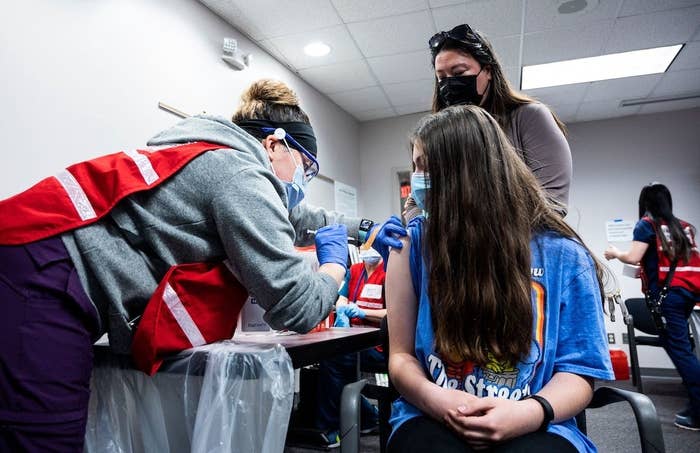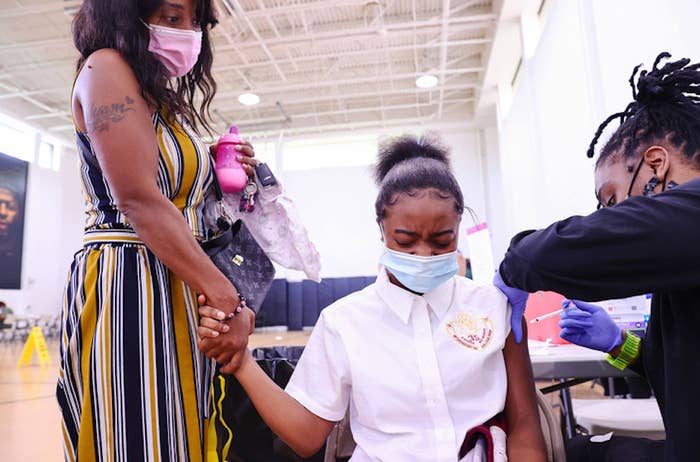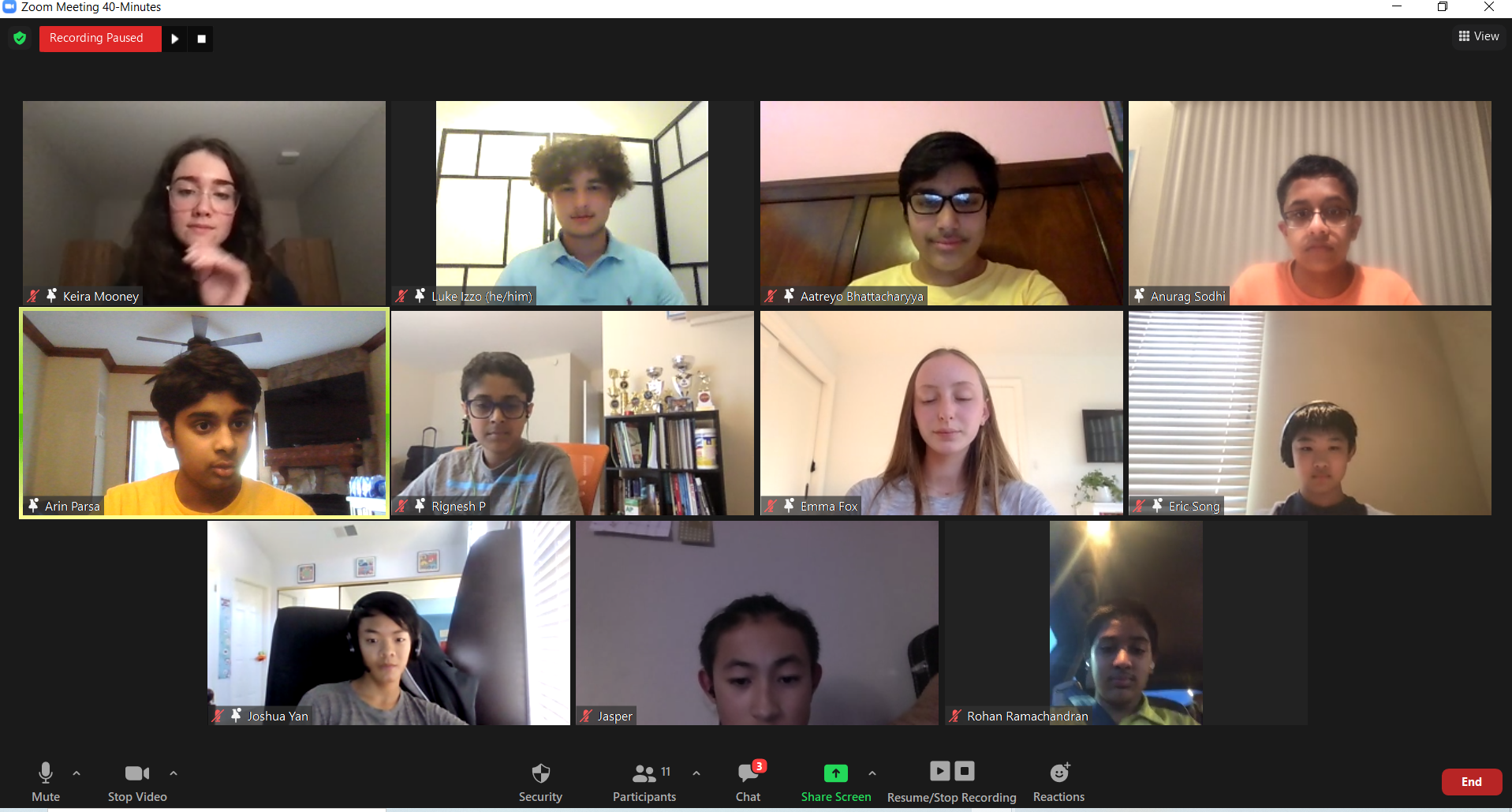
After Shayne Zeller contracted COVID, getting sick and losing his sense of smell for months, he decided to get vaccinated and has been working hard to convince his friends to do the same. But it hasn’t been easy for the 17-year-old.
Amid a national COVID-19 vaccine rollout now defined by pockets of hesitancy across the US, children and parents are debating who has the right to make decisions about young people getting the shot.
“I don’t want them to get sick with COVID, because it really sucks,” said Zeller, a high school student in Holly Springs, North Carolina, who’s been working to counteract the misinformation his friends believe. “It is really annoying how a lot of them just don’t want to take it. A lot of them are just too lazy to take it.”
Even so, Zeller believes every teenager should be able to make their own choice when it comes to the vaccine — regardless of what their parents think.
Zeller is among a growing number of teens who have taken up sharing information with one another, preparing to guide skeptical parents and peers through difficult conversations, and advocating for legislation that empowers them to make their own medical decisions.
“As teens face increasing obstacles, particularly around the need for parental consent, I’ve seen them increasingly take matters into their own hands and actively work to get vaccinated,” said Kelly Danielpour, 18, founder of VaxTeen, a teen-run organization that counters vaccine misinformation. “As we approach the start of a new school year, vaccinations have come to mean so much to my generation … not only their right to feel safe and protected, but the key to returning to their lives. We shouldn’t deny them that.”
The CDC recommended the COVID-19 vaccine in May for kids 12 and older who are able to get the two-dose Pfizer-BioNTech shot, which is under emergency use authorization for kids 12 to 15 years old and fully approved for anyone over 16 years old. Both Pfizer and Moderna are still in the process of collecting data on the safety and efficacy of the shot for kids ages 5 to 11. Once those clinical trials are concluded, the FDA will need to evaluate the data and authorize emergency use of the shots, and the CDC will follow up with its own recommendation. (The FDA has said it expects vaccines for kids under 12 to be authorized on a “fall or winter timeline.”)

And as the new school year commences, time is of the essence. Thousands of kids in Mississippi and hundreds in South Carolina have either tested positive for or been exposed to COVID-19 within the first week of classes, forcing students into quarantine. Both states have low vaccination rates.
But since the spring, states including North Carolina, Tennessee, and South Carolina, as well as the District of Columbia, have taken legislative action to curb minors’ decision-making power when it comes to getting a vaccine.
“Laws that were on the books prior to COVID-19 are getting a new look in light of the current situation [both for and against parental consent],” said Jennifer Tolbert, director of state health reform at the Kaiser Family Foundation.
Still, parents will continue to be the determining factor in whether children and teens get vaccinated — at least until a COVID-19 vaccine gets final approval from the FDA for kids of all ages and the shots can be mandated in schools, she added.
In the meantime, the debate will likely get more intense, especially as children return to school.
Kira Kroboth, a parent of three boys ages 5, 9, and 11 in Raleigh, North Carolina, told BuzzFeed News her community has been marked by a hostile debate between camps of pro- and anti-vax parents, and the issue of parental consent has only heightened tensions.
“There’s a huge group who believe a lot of theories,” Korboth said, adding that instead, these parents have embraced conspiracies about the government attempting to control their personal decisions.
Forty-one states require parental consent for minors under the age of 18, but a few allow some teens to get a vaccine without their parent or guardian’s approval, Tolbert said.
In Rhode Island, South Carolina, Oregon, Alabama, and the District of Columbia, minor consent for vaccination depends on their age, ranging from 16 years old to 11 years old, according to KFF. Other states, including Arizona, Idaho, North Carolina, Tennessee, and Washington, have “mature minor doctrines,” a kind of law that allows minors to demonstrate they are informed enough to make healthcare decisions independent of their parents.
The South Carolina legislature introduced a bill in June that would prohibit minors from receiving COVID vaccinations without parental consent. Parents in DC launched a second lawsuit against city officials in July over a new law passed earlier this year that allows children as young as 11 to get a vaccine without adult approval.
“Even as a minor, you are your own person and you’re entitled to agency in your own body,” DC Ward 3 Councilmember Mary Cheh, who spearheaded the city’s minor consent law, told BuzzFeed News.
In North Carolina, the state Senate earlier this month unanimously approved legislation that would require minors to have parental consent for the COVID-19 vaccine.
That law, which was signed by Gov. Roy Cooper this week, says that a parent or guardian must give permission for a child to receive any vaccine approved by federal regulators for emergency use. Once vaccines receive full approval, parental consent is no longer required and kids can opt-in for shots under the state’s mature minor doctrine if they desire.
While the two-dose Pfizer-BioNTech COVID-19 vaccine was upgraded to full authorization this week for individuals 16 years and older, it is still under emergency authorization for children ages 12 to 15 years old, North Carolina State Sen. Sarah Crawford confirmed in an email to BuzzFeed News. This means the new parental consent law will apply to minors aged 15 years old or younger.
Local parents and advocates have been divided over the question of consent.
While clinical trials for the mRNA vaccine in kids under 12 are still underway, researchers have been studying and working with mRNA for decades, according to the CDC. Large-scale clinical trials have demonstrated the safety and efficacy of the shots, which have now been distributed to hundreds of millions of people across the world. And the state of North Carolina does not currently mandate that any individual of any age get the COVID-19 vaccine.
“I don't know that any amount of perfect data that you place in front of people who are so against [the shot] is gonna change their mind. And that makes me sad, because I want those kids protected,” Korboth said.
Katie Rienzo, a parent of a 12-year-old in Apex, North Carolina, said she fears that adding a consent requirement will inadvertently boost vaccine hesitancy.
“If they say this is important [enough] to add a parental consent clause, but we don’t have fully FDA-approved vaccines [for children], I think parents will go, ‘What am I missing? What are they not telling us?’” Rienzo said.
BuzzFeed News has reached out to the North Carolina Department of Health and Human Services for comment.
For some young people, sharing as much information about the vaccine as possible — especially because of the way the pandemic has impacted their mental health, school progress, and social lives — has become a vital mission.
“The fact that teens have not at all been involved in the discussion, it has been the most shocking,” Arin Parsa, the 13-year-old founder of Teens for Vaccines, told BuzzFeed News.

Parsa, a ninth-grader in San Jose, California, started his organization to support the creation of minor consent laws, report vaccine-related misinformation that appears on social media, and help teens talk to their parents or guardians about wanting to get vaccinated.
“[Teens with anti-vax parents and guardians] are living in sheer fear, sadness, and frustration,” Parsa said. “The issue goes far beyond public health, parental assurance. The mental health of teens suffering in silence matters. They deserve to be heard before laws are passed that affect them. This decision by the [North Carolina] Senate to require parental consent can set a dangerous precedent and is most certainly regressive.”
Ashlyn Adams, a ninth-grader in Raleigh, North Carolina, said teens like her shouldn’t be considered “extensions of our parents” when it comes to getting the COVID-19 vaccine.
“We are our own people,” she said.
Ashlyn and her 12-year-old sister, Alyssa, both agreed they were “lucky” to have parents who supported getting the vaccine, but they would have gotten vaccinated regardless of parental approval.
Their mother, Kristin Raynor, said she was “conflicted” over the question of requiring parental consent for the COVID-19 vaccine, but was willing to “think outside the box” when it comes to the needs of children who may have to make their own decisions.
Parsa said he was extremely frustrated after lawmakers' decisions in states like North Carolina, adding he’s upset teens haven’t been part of similar conversations in Tennessee. Officials there took measures to shift vaccine decision-making to parents last month when the state health department temporarily paused all vaccine-related outreach to teens.
“The reason that we paused is because we wanted to leave no room for interpretation,” Tennessee Health Commissioner Lisa Piercey said in a July press conference. “There was a perception that we were marketing to children, and that totally was against our view about the importance of parental authority. We strongly believe that parents are the best decision-makers when it comes to medical decisions for their children.”
The move was a response to Republican lawmakers who criticized the agency for doing vaccine outreach to teens in schools and on social media.
John DeVore, a teacher and parent of two children from Hixson, Tennessee, told BuzzFeed News that the pause in outreach could mean already-hesitant parents missed vital vaccine information because they weren’t getting consistent messaging. But as a teacher, he loves to see student advocacy when “we have adults that can't seem to get beyond some sort of political narrative that they've been fed.”
“I’m anticipating lots of screaming at school boards,” DeVore said of the start of the school year. “It’s going to impact the classroom … all of the educators are going to feel that anger.”
Piercey said Tennessee would continue administering COVID-19 vaccines under its doctrine that states minors ages 14 or older don’t need parental consent to receive medical treatments, including vaccinations. But she said the state would do so only in “fringe and nuanced” cases.
The resumption of outreach came on the heels of the health department firing its top official, Dr. Michelle Fiscus, after she shared accurate information with medical providers about the doctrine.
“This generation is very savvy. They know how to find information and are often skilled at discerning the quality of information they find,” Fiscus said.
For teens like 13-year-old Rohan Ramachandran, a Teens for Vaccines ambassador in Nashville, now it’s about getting that information out.
“A lot of my friends are pretty angry about the situation,” he said. “We’re just getting more motivated.”
